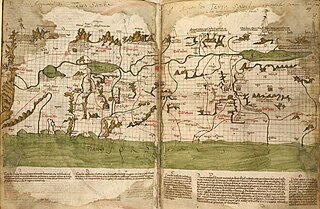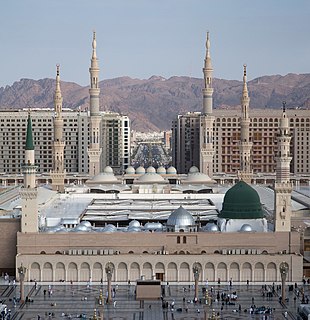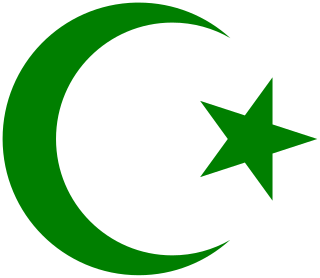Holiest sites in Islam may refer to:
Holiest sites in Islam may refer to:

The Holy Land is an area roughly located between the Mediterranean Sea and the Eastern Bank of the Jordan River. Traditionally, it is synonymous both with the biblical Land of Israel and with the region of Palestine. The term "Holy Land" usually refers to a territory roughly corresponding to the modern State of Israel, the Palestinian territories, western Jordan, and parts of southern Lebanon and southwestern Syria. Jews, Christians, and Muslims regard it as holy.

Al-Masjid an-Nabawi, known in English as The Prophet's Mosque, and also known as Al Haram, Al Haram Al Madani and Al Haram Al Nabawi by locals, is a mosque built by the Islamic prophet Muhammad in the city of Medina in the Al Madinah Province of Saudi Arabia. It was the second mosque built by Muhammad in Medina, after Masjid Quba'a, and is now one of the largest mosques in the world. It is the second holiest site in Islam, after the Masjid al-Haram in Mecca. It is generally open regardless of date or time, and has only been closed to visitors once in modern times, as Ramadan approached during the 2020 COVID-19 pandemic.
Kaba may refer to:

A shrine is a sacred or holy space dedicated to a specific deity, ancestor, hero, martyr, saint, daemon, or similar figure of respect, wherein they are venerated or worshipped. Shrines often contain idols, relics, or other such objects associated with the figure being venerated. A shrine at which votive offerings are made is called an altar. A shrine is a place for gods.
Custodian may refer to:
Mecca is a city in Saudi Arabia and the holiest site in Islam.
Amir Junaid Muhadith, best known by his stage name Loon, is a former American rapper best known for his association with Sean Combs's Bad Boy Records. He was featured artist on Combs's 2002 hits "I Need a Girl " and "I Need a Girl ".
There are two official holidays in Islam, Eid al-Fitr and Eid al-Adha. Both holidays occur on dates in the lunar Islamic calendar, which is different from the solar based Gregorian calendar, so they are observed on different Gregorian dates every year. There are a number of other days of note and festivals, some common to all Muslims, other specific to Shia Islam as a whole or branches thereof.
Baitullah, an Arabic phrase meaning "House of God", may refer to:
The Holy Land refers to any place that is considered sacred.

Hala Sultan Tekke or the Mosque of Umm Haram is a mosque and tekke complex on the west bank of Larnaca Salt Lake, in Larnaca, Cyprus. Umm Haram was the wife of Ubada bin al-Samit, a companion of the Islamic prophet Muhammad, and foster sister of Muhammad’s mother, Aminah bint Wahb.

The four holiest sites in Islam are the Kaaba inside the Masjid al-Haram in Mecca as the holiest of the four, followed by Al-Masjid an-Nabawi in Medina, Al-Aqsa Mosque in Jerusalem and the Umayyad Mosque in Damascus; these sites are accepted in this order by the overwhelming majority of Islamic sects which are all held in high esteem. The two holiest sites of Mecca and Medina in Saudi Arabia are directly mentioned or referred to in the Quran.

Nabi Habeel Mosque, or "Mosque of the Prophet Abel", is a shrine dedicated to Habeel, located on the west mountains of Damascus, near the Zabadani Valley, overlooking the villages of the Barada river, in Syria, the Levant.

Shia Muslims consider sites associated with Muhammad, his family members, Shia Imams and their family members to be holy. After the four holy cities of Islam, Najaf, Karbala and Qom are the most revered by Shias.

Sunni Muslims consider sites associated with Ahl al-Bayt, the Four Rightly Guided Caliphs and their family members to be holy. the three holy cities of Islam are Mecca, Medina, and Jerusalem.
Temple denial is the assertion that the successive Temples in Jerusalem either did not exist or were located elsewhere than on the Temple Mount. Israeli writer David Hazony has described the phenomenon as "a campaign of intellectual erasure [by Palestinian leaders, writers, and scholars] ... aimed at undermining the Jewish claim to any part of the land", and compared the phenomenon to Holocaust denial. Daniel Levin calls Temple denial a "relatively new phenomenon" that "has become a central tenet of Palestinian nationalism". He stated: "The Islamic land trust is destroying Judeo-Christian ruins beneath the Temple Mount so as to deny any connection between Judaism and Christianity and Jerusalem."
In 2009, clashes between Muslim Palestinians and Israeli police erupted on September 27, 2009 and continued to late October. Violence spread through East Jerusalem and parts of the West Bank, and included throwing of Molotov cocktails and stones at Israeli security forces and civilians. Israeli police responded with arrests of rioters and sporadic age-based restriction of access to the Temple Mount. Several dozen rioters, police and Israeli civilians have been injured.
Haramayn, is the traditional Islamic appellation of the two holiest cities of Islam, Mecca and Medina. It may also refer to:

The Islamization of the Temple Mount is the historical process by which Muslim authorities have sought to appropriate and Islamicize the Temple Mount for exclusive Muslim use. Originally an Israelite and subsequently Jewish holy site, as the location of the First and Second Temples, the site was subsequently the location of a Roman pagan temple, a Byzantine public building, possibly a church, a garbage dump, and later the Dome of the Rock and the Al-Aqsa Mosque. It is the holiest site in Judaism and the third holiest site in Sunni Islam.
Muhammad Sadiq may refer to: